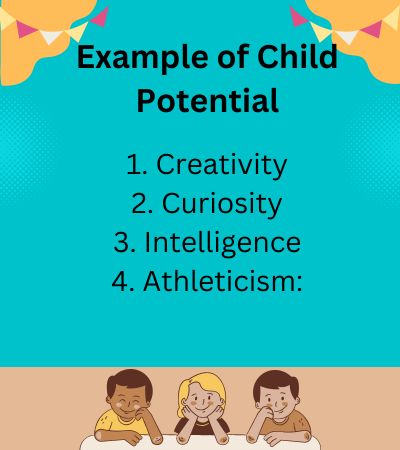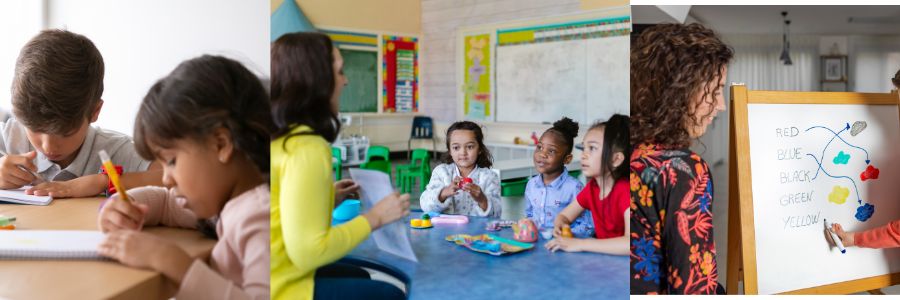Contents
How to Identify Child’s Potential: In the 21st Century, we are in an era that requires parents and guardians to identify their children’s potential and talents. Advanced technology, information availability, and emerging new opportunities require parents to be aware of their children’s potential.
Below we have looked at some of the best ways on How to Identify Child’s Potential
Example of Child Potential
1. Creativity: A child can show an inborn ability to have a creative mind by coming up with some original and exceptional ideas
2. Curiosity: Children who are normally curious are likely to have a thirst for knowledge and a desire to discover their environment.
3. Intelligence: Children who have a high level of intelligence may top in academics and be able to understand difficult ideas at an early age.

4. Emotional intelligence: Emotional intelligence is another child’s potential example. Children who have a strong sense of empathy and can be able to understand and manage their own emotions, as well as those of others, maybe most well-suited for careers in fields such as education or counseling.
5. Athleticism: Strength, fitness, and agility are other ways to identify a child’s potential. Natural ability for sports and may have the potential to become elite athletes with proper training and coaching.
6. Leadership: Children who have strong leadership skills may be able to inspire and motivate others and have the potential to become successful in fields such as business or politics.
Read: What Career is Right for me Based on My Personality
How to Identify Child’s Potential?
For decades we have been allowing teachers and fate to play a major role in identifying our children’s potential. As result, many talents and abilities of children in the 21st century have gone unnoticed. Children are labeled ‘clever’ or ‘stupid’ depending on their ability to solve problems as per the ‘expected answers’. We have been overlooking the importance of understanding that children are gifted differently. In order to identify your child’s potential and build talents, we have outlined the following measures:
-
Offer different learning opportunities.
A child’s potential and talents sometimes can be hidden and to unveil them requires different exposures. It’s easier to identify talent by providing different learning opportunities to children. Below are various Learning activities that can expose your child’s talent:
Outdoor activities– For example outdoor games, hikes, adventure walks, educational trips, etc. All these opportunities provide learning and self-discovering chances for children.
Experiment -Allow your child to test out their ideas using a variety of media, materials, and tools provided. Provide resources that support learning and development in mental ability, social interaction, emotional development, cognitive development, etc.
Engage in Meaningful Inquiry: To discover talents in your child, engage in various modes of interaction and thinking. Let them develop several solutions to the problems facing them.
Research– Let your child conduct simple research that can allow them to discover better personal understandings of any topic of their concern.
Read: Best Method to Study for Exams
-
Observe and praise achievement.
Take time to watch your child play. Don’t assume that your child’s play is meaningless. A child can act and take part in behaviors that may show their individual interests, intelligence, and capability. When a child’s efforts are praised, the child tends to take more risks regardless of the mistakes or failures undergone. Through adequate and positive correction, a child’s mistake can become a learning opportunity.
-
Provide motivation and support.
Emotional and physical support is very important when developing any talent in children. Negative criticism should be avoided to prevent the loss of internal motivation. Embrace the effort put forward by your child.
-
Encourage practice and mimicry.
Ever wondered why football players like Messi and Ronaldo look so talented? The secret behind their success lies in the effort and practice they put in their talents and potential. Over the years they have practiced playing football so many times that on the day of any competition they often feel confident as they know what is expected of them. The easiest way you can build your child’s potential is by making them practice what they love. If it is playing the violin let them practice as much as possible. Repetition is the key to improving your child’s potential.
Read: Qualities of a Good Elementary Teacher
Summary: How to Identify Child’s Potential.
- Offer different learning opportunities.
- Observe and praise achievement.
- Provide motivation and support.
- Encourage practice and mimicry.
Conclusion: How to Identify Child’s Potential
There are many child potential examples that you can consider to identify a child potential. As you put into practice the above points on How to Identify a Child’s potential let your child know that failure is not a verdict—it’s the way forward. In addition, mistakes are not something to be embarrassed about, they are steps on the way to success.

Betty is a qualified teacher with a Bachelor of Education (Arts). In addition, she is a registered Certified Public Accountant. She has been teaching and offering part-time accounting services for the last 10 years. She is passionate about education, accounting, writing, and traveling.
